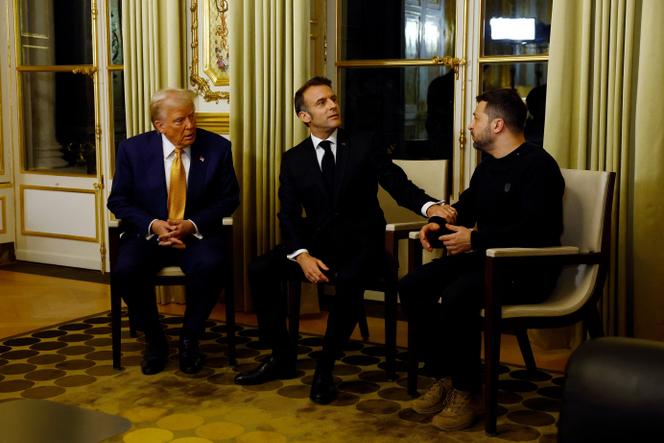


Here's the picture. Emmanuel Macron, flanked by Donald Trump and Volodymyr Zelensky, with serious faces after a brief handshake, in the Salon Doré of the Elysée Palace. The trilateral meeting the French president had been hoping for in recent days did indeed take place on Saturday, December 7. The meeting lasted 35 minutes. As they left the palace, the three leaders greeted each other looking slightly more relaxed – Trump tapping Zelensky on the forearm as they shook hands – before heading off to the reopening ceremonies for Notre-Dame de Paris.
The meeting was only agreed upon at the last minute, in the heat of the moment, so to speak. Arriving 43 minutes late, Trump first spoke face-to-face with Macron, before finally agreeing to the three-way meeting that the Elysée had been proposing for several days. Then, together, they welcomed the Ukrainian president, who had come especially to plead his cause and that of his country to the American president-elect. During the US election campaign, Trump boasted of finding a way out of the war unleashed by Russia in "24 hours," while his vice president, JD Vance, intends to reduce US military support in order to force Kyiv to negotiate with Moscow.
Apart from the symbolism and the diplomatic coup pulled off by Macron, nothing has filtered out about the content of the talks, save for a few terse messages. "A good and productive trilateral meeting," commented Zelensky on X: "We all want this war to end as soon as possible and in a just way," wrote the Ukrainian president, adding that "peace through strength is possible." "Let us continue our joint efforts for peace and security," Macron tweeted a few moments later. His entourage described the conversation as "very good" and "substantial." "Proud of the friendship between the United States and France," wrote Macron. "There are so many challenges for us to face together."
To discuss some of these "challenges," the American president-elect was accompanied to the Elysée by his chief of staff, Susie Wiles. Steve Witkoff, his special envoy for the Middle East, was also there, as was Massad Boulos, his Middle East adviser. With Anne-Claire Legendre, Macron's Middle East adviser, they were to discuss the situation in Syria, where the Assad regime is threatened by the advance of jihadist rebels, now close to Damascus. Tensions with Iran, its advancing nuclear program and the risk of a regional conflagration were also to be discussed, while fighting continues in the Gaza Strip and the ceasefire in Lebanon is fragile. By contrast, Trump came without his emissary for Ukraine, General Keith Kellogg.
You have 13.74% of this article left to read. The rest is for subscribers only.
